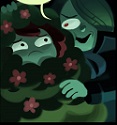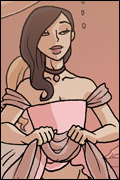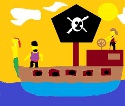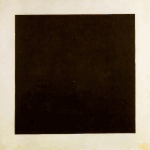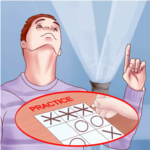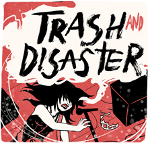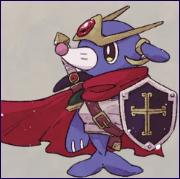|
Poison Mushroom posted:'Paint-the-grid system' is a phrase that makes me want to design a Jet Set Radio game. A little while back I wanted to think up a system that was based solely around just spreading your color around a map, but then I realized that's more or less just Kingdom Builder. I more or less cribbed the idea I had originally to use for Gelatinous Cubes. ActingPower posted:I was gonna say you should just switch the dice out for, say, poker chips, but then I realized that would basically be Small World then. Really, using dice basically came from just the theme.  Using poker chips stacked up would probably be a much more elegant system. As for how cubes regenerate, I'm not entiiiiirely sure. My initial thought would be every turn you get X small cubes / chips to add anywhere on the board, but I'd rather come up with some way to have it a bit more interactive. Since pieces can move across painted spaces without losing power, I would suspect that the ideal strategy would be to use up / sacrifice some big units early on in order to create some "roads" for the rest of your units to travel along. Using poker chips stacked up would probably be a much more elegant system. As for how cubes regenerate, I'm not entiiiiirely sure. My initial thought would be every turn you get X small cubes / chips to add anywhere on the board, but I'd rather come up with some way to have it a bit more interactive. Since pieces can move across painted spaces without losing power, I would suspect that the ideal strategy would be to use up / sacrifice some big units early on in order to create some "roads" for the rest of your units to travel along.Playtesting it now solo and making it so every time you take enemy pieces, you can then place down the same amount you've taken in any spot you've got cubes. Not sure how I like it, though.
|
|
|
|

|
| # ? May 14, 2024 03:14 |
|
So, working on Feint wars some more, my miniatures game. The main mechanic of this game is when a unit does something that would provoke an attack of opportunity (moving into or out of the "guard range" which is a square too close for that unit to attack, or some special actions) players both bid a number of their attack dice. If the person who would get the opportunity attack bids equal or more dice they get the attack, but they only use the unbid dice as the attack. If not enough dice is bid, then there's no oppertunity attack. The triggering character's turn continues, but if they attack this turn they have to use unbid dice for their attack. So basically the AoOer is bidding accuracy of the attack and the other is bidding ability to attack this turn. The problem is, I'm not sure if this is interesting, if there's a way of really predicting what the person will bid, or if it's essential a random two-part rock paper scissors. I'm also contemplating some sort of negative ability where swinging the weapon is slower, thus after attacking or making an AoO their slower attacking, AoOing or parrying again, but I'm not sure what that does, since it just seems too strongly incentive a low bid for those provoking against such an ability. Also, it just feels like it makes it more random if they get higher damage as an offset. Basically it sounds like something that could work in a Single player video game, but not really in multiplier. Foolster41 fucked around with this message at 09:48 on Nov 1, 2014 |
|
|
|
So because of my news job I got stuck gripping at a republican election watch party making sure nobody hosed with the camera for 8 goddamn hours. At any given moment I may have to run a cable somewhere or get the reporters pizza so I couldn't just slam out some Friday or Space Hulk: Death Angel or other single player games while I sat there. Lucky I had a trusty old deck of 52 in my bag and started playing Single Hand Solitare. It's where you take a shuffled deck and draw 2 cards and send one to the back of the deck. From then on you draw 1 card and choose one to send to the back and repeat until you have the entire deck organized. After you draw a card if they are connected (2 of clubs and 3 of clubs) you got to keep both as a "collect" and draw again until you send it to back or your "collect" hits 4 cards then you must move it to back. This got me thinking about making a solo game where you never set the cards down or if you do you can put it in your pocket and bring it out where you left off. You hold the deck with 1 hand and mess with it with the other drawing cards or flipping them. Also thinking about putting certain cards between different fingers on the deck hand as a stash. So far theme-wise the easiest one would be "fighter vs dungeon" but I'm trying to see if I can make it fit more with wildlife photography or something.
|
|
|
|
Broken Loose's Coup Sequel He Mentioned: Okay, so before anything else, you need to have: coin tokens and knowledge of how to play Coup. This game exists in a legal gray area. Game mechanics can't actually be copyrighted, and while there is a lot of Coup 1954 Guatemala (which hasn't yet released) in this there is still a fair amount of my own unique stuff. I like Rikki Tahta, but I hate Indie Boards & Cards. I'm pretty sure it's all cool though once I make my own cards and poo poo. (Also 1954 Guatemala isn't that good and this improves on it in basically every conceivable way) The game doesn't have a name yet. Just calling it Coup++ for now. SETUP CHANGES: You may notice that there are 20 different characters instead of Coup's 5. You will select 5 of these at random to use in the game. Keep the master copy in the center of each of the table for reference, and use the 3 remaining copies to constitute the Court Deck. Each character has a TYPE. The types are Capital, Informant, Force, Agent, and Support, with 4 characters of each type. For a balanced game, pick 1 of each type during your random selection. For a wacky game, pick whatever you want. For a monkey cheese batshit game, leave all the master copies in the center, shuffle literally all the other cards, make a deck of 15 random cards from that pile, and eat them off the floor like a animal you piece of poo poo That's it! Everything else is pretty much the same! All the basic actions are identical to Coup (Income, Foreign Aid, Coup, etc) but the Character actions are unique based off which characters are in the game. Some actions are set per character type. Master List of Characters Capital > Reaction: Block Foreign Aid taken by an opponent.
Informant > Reaction: Block any Agent action used against you.
Agent > Reaction: Block any Agent action used against you.
Force
Support
**If multiple players claim this, they do so simultaneously before challenges may be issued. The money is divided evenly between them, with any remainder going to the Bank. I tried to be as careful as I could with "opponent" wording to make it clear which actions can be used against your teammates in Reformation. If using Reformation faction rules, the Embezzle action claims that you have Influence over no Capital-type characters. I'll post my artscow version of this once I finish making it. Broken Loose fucked around with this message at 10:04 on Nov 7, 2014 |
|
|
|
Yet another project, which I'm calling lost in the woods. It's inspired partly by the new cartoon network miniseries "over the garden wall" (which is great by the way), and also stuff like the anime Kino's Jounrey would fit the feel of what I'm going for. The game is sort of collaborative story game about a group of children who are, as you'd imagine lost in the woods. So far I'm not sure about mechanics, I only have a few vague ideas. I think players draw place and effect card, which would indicate what happens to the people and where, which is the problem to be solved. For example it might be "Sleepy at the Inn" (Maybe the inn makes people fall into a perpetual sleep?), or "Hungry at the school house" (The children are hungry, and are offered food by a kindly school teacher, but find the kindly school teacher is a cannibal.). I'd want this to very much not be about combat at all, and the idea would be facing things like monsters head-on would be fatal. If they defeat monsters it's through nimble dodging and/or trickery (for example, throwing something the monster is chasing into somewhere dangerous). I was also thinking there would be a set of cards indicating the met person's attitude towards them. Some are helpful, but some lead them astray or try to delay them, or even lead them to danger. it would be a card dealt from a small deck of cards (~9 cards), and one of the player abilities (possibly another type of card, dealt out at the beginning) would be to look at 4 of the remaining cards to try to gauge their motives. I was thinking part of the mechanics might be based on items that are spent to do things. Like I said, vague ideas, and I worry maybe I have too many different ideas in this (and too many cards). I definitely need something more cohesive keeping this whole thing together. I'm thinking it'd play something like Fiasco where the dice and stuff is a sort of oracle that drives the story, though this is about the steps in the journey and looking back at all the near misses and everything the group survived through rather than everything expecting to go horribly wrong in Fiasco. :P Foolster41 fucked around with this message at 11:37 on Nov 18, 2014 |
|
|
|
quote:I'm thinking it'd play something like Fiasco where the dice and stuff is a sort of oracle that drives the story, though this is about the steps in the journey and looking back at all the near misses and everything the group survived through rather than everything expecting to go horribly wrong in Fiasco. :P Going off of your idea of fate and an "oracle" mechanic would be using runes instead of dice. Have a bag with a number of specific runes in it. One side of each rune is black (negative twists) and one side is white (positive twists). The symbols on the runes interact with certain event cards. So, for the "Sleepy at the Inn" card, you might have a rune in the bag that represent dreams, and if it's cast for the Inn card then the effects of the positive or negative result are doubled. You could increase player agency by having a deck of trumps (like Tarot trumps) that allow them to influence the random aspects of the game. That's just a brainstorm, but it would be thematically fitting with your game, give elements of randomness, and give elements of choice. ------- I've been working on a game where players have two major attributes that they build over time: Dice, selected from a pool, of a D4s, D6s and D12s. Charms, from a pool of about 100 cards, that the player can have three (working number) of at any time. In general, charms effect dice rolls. Players then move around a board pulling encounters, which have checks that they must meet using their current dice pools. There are 4 face-up encounters at a time, and each turn the player can swap one die in their pool. Encounters are trying to fit a number of conditions on die faces: Over X - players roll to beat a certain high number. Under X - players roll to get lower than a certain number. Odd - players roll to get a total odd number on the dice. Even - players roll to get a total even number on the dice. Prime - players roll to get a total prime number on the dice. Sum Zero - players can either add or subtract dice from each other, must use all dice, and win if they get it to zero. Match - players win if they can get all die faces to match one another. Sequence - players win if they can get the dice in sequence with each other. Unique - players win if they can get unique results on each dice face. Pure Impulse - players win if they can get all impulse results on the die faces. Factor 2 - players win if combined total of dice is divisible by 2. Factor 3 - players win if combined total of dice is divisible by 3. Factor 5 - players win if combined total of dice is divisible by 5. So if you're trying for an Under X check, then you would swap in a D4. If you're trying for an Over X check then you swap in a D12. Charms take effect with "impulse" rolls. Each charm has an impulse value, and an effect that takes place when it is rolled. For example, you might have, Sword Charm Impulse: Even Add one to the face value of any die rolled on your turn. You must take this effect. or, Wing Charm Impulse: Four Flip one die to its next highest face value rolled on your turn. You may take this effect. or, Candle Charm Impulse: Over Six Discard any currently held charm, and draw a new charm to replace it. This takes effect on any roll. You must take this effect. In essence it's a lot like Talisman (lots of random encounters met by rolling dice), but with the goal of having character building to make event resolution more interesting. Two main question: Does this sound like it could lead to interesting gameplay? Any ideas for die checks that I haven't thought of yet?
|
|
|
|
Hmm. The runes are an interesting idea. I've been working on Lost in the woods a little more and have a little bit better idea of how this game could go. Players take turns being the target of the scenario cards, played by a "storyteller" player. When a card says someone takes damage or loses morale, it is this player who it happens to. Scenarios either raise of lower the "danger" track. Good cards for the travelers raise danger, and bad cards lower it (it basically functions as a sort of "manna"). Players get a hand of item cards that they can play and explain how they are using it in the situation (so from a story standpoint it has to make sense). Each player may play one card. Then they roll a die (a d8) and add 1 for each card they play. If it is higher a good thing happens, and if lower a bad thing happens. Some cards require a "motive check" (which is not a very good name), which is more of a overall senses check (though I don't like that name either). Players draw andn look at 4 cards/tiles. Half of them are "good" and half are "bad". The players can decide whether they want to back off (cut their loses) or push on. A traveler has health and morale, and if either is put down to 0 they cannot play cards (they also cannnot raise or lower health or morale, if they are the target it's redirected to the player to their right). For example one card is "Train bridge" that has the text: "Motive Check.Reveal the motive card. If it is (good), Discard the top two scenario cards. If it is (bad), you have -2 Health. So best case scenario is you get across and save time, and worst case scenario one traveler takes 2 damage. I'm not sure if this is interesting, or maybe this has way to many mechanics and since this is a story game I should go for simpler. This game is starting to feel more "A winter's tale" than "Once upon a time." Also, I keep coming up with scenarios that are 0 value and are basicly trade-offs of both good and bad things, and I'm afraid having lots of these are uninteresting. Also, the game seems way to easy, but I don't think simply making the challenge goals higher (require a 6 or higher instead of 5) would be very interesting, or present the players with interesting new choices. I keep thinking back to the concept of "mutiple fronts" that great co-op games like Pandemic, Shadows over Camelot and Forbidden Desert have. This games doesn't feel like it has that, it just has two separate life counters that some cards put one down. I'm wondering if maybe the whole improvising items thing is the wrong direction.
|
|
|
|
I feel like there's still an unfilled niche for easy to teach games that straddle the line between board gaming and Role playing game. Especially ones that work as a gateway drug from one to the other. I've got a few ideas for one, so I'll peck away at throwing out some ideas once I'm not phone posting on my break at work. But I'm trying to find a trifecta of flexibility, elegance of mechanics/design, and marriage between mechanics and flavor. girl dick energy fucked around with this message at 15:34 on Dec 11, 2014 |
|
|
|
So I've been brainstorming a game idea that captures the idea of Players vs Boss that MMO's tend to revolve around at endgame into a Players vs AI system. Right now I think I've got a rough idea shaping out but I'm left wondering if anyone can give me some examples fo similar systems. Off the top of my head the only game I can think of is the WoW TCG Dungeon's (that I've never played) and the Monster Hunter game that was posted in here. Can anyone think of something similar to this that I can look into for research?
|
|
|
|
Sort of related, I have a concept for a game based around MMO raid bosses which I tentatively called Loot Drama, I never really filled it out but my idea was that everyone had to work together to kill the boss but then fight it out over the loot. One player would control what the boss does each turn so you can try to have it kill someone else who might get your loot but you don't want everyone to die because then you'll fail and get nothing. I planned for the boss to have a deck of ability cards and each turn the active player would draw three (or so) and then pick one to play. There'd be some bluffing involved with claims that "it was the best one, honest!" because nobody else would see which cards you had to pick from. Then the players would all make a move or do a thing to respond to that, and then you'd resolve the damage. I didn't really get to the fine details but this was my way of avoiding the problem of creating an interesting AI.
|
|
|
|
Poison Mushroom posted:I feel like there's still an unfilled niche for easy to teach games that straddle the line between board gaming and Role playing game. Especially ones that work as a gateway drug from one to the other. Warhammer Quest. Some of the best parts of the game were the random events that happened in towns. Now, granted, it's an ancient system with a lot of mechanics that would be poo-poo'd by modern audiences. It's hella inelegant and totally concerned with being muderhobos. Or Fiasco coming from the other direction, all story game but designed to be a done-in-one that can sort of have a winning player. I like both of these games, as I am a tasteless heathen. Anniversary posted:So I've been brainstorming a game idea that captures the idea of Players vs Boss that MMO's tend to revolve around at endgame into a Players vs AI system. Right now I think I've got a rough idea shaping out but I'm left wondering if anyone can give me some examples fo similar systems. Off the top of my head the only game I can think of is the WoW TCG Dungeon's (that I've never played) and the Monster Hunter game that was posted in here. Can anyone think of something similar to this that I can look into for research? Gotcha covered! Sentinels of the Multiverse is *very* much a PCs vs. Boss and feels quite like an MMO fight. I used to lead raids and I absolutely love these kind of mechanics, so this is a system that I really enjoy. SOTM gives each player a super-hero and a deck specific to that character which contains abilities, buffs, etc. It's got some flaws to be sure, lots of sort of number-crunchy fiddliness that, again gets rightfully called inelegant, worse, there's nothing stopping a quarterback from running the table, especially if they know all the cards in everyone's deck (not terribly hard.)
|
|
|
|
Sentinels has some real problems, but our group had some fun with it, and you see occasional glimpses of a much better game shining through. Mostly, the designers just didn't give themselves enough design space to work in, and that means that they torture the hell out of the few mechanics they have (draw cards, look at cards, heal, +1 Damage given, -1 Damage taken, draw -1 damage look heal?). The resulting game too often ends up feeling fiddly (because they pile on more cards generating these effects) and bland (because too much of it is the same/irrelevant, and too few interesting decisions come up for the players). Some kind of time mechanic (eg. Glen More time wheel) would have been great, or even just some "energy" type currency. A market/upgrade system would probably have worked. Boss specific "decision points" would have been cool. Better card design/streamlining would have helped. Pretty much anything else they could have added would have helped. Hell, combat dice would probably have made the game work better. But anyway, yeah, I'm not making a point of ragging on Sentinels (or trying to sell it); all I'd say is it's worth checking out if you're interested in exploring this space.
|
|
|
|
Thanks for pointing me towards Sentinels, that does seem right up the alley of what I'm working on. I'll have to try to get a play of it in sometime, but no group I know has it so doing so may be a little tricky. Right now I've worked out one 'Boss' and a couple of Player classes to a degree that once I get prototyping materials (which are in the mail) I feel pretty ready to give it a go. Initially I was going with a cards in hand are the resource you use to play cards, but I decided to switch to a time resource mechanic as that allows me to scale the amount of time you have per Boss as an added balancing method. Unfortunately for now all the number I've assigned to things are very much guesstimates but hopefully they hold up to playtesting. Other than the narrow options what are some things that SotM gets very right/wrong for the genre?
|
|
|
|
Hey guys, do you recall this type of thing in wargames where players move around particular leaders, who pick up (and perhaps drop) generic soldiers, who either cannot move on their own or do it in a ridiculously inefficient fashion? Numerous CDG, for example. My question is, what game, of those that you know, has the most of such leaders running around at the same time? My best bet so far is Time of Troubles, I think, with 26 leaders, but that doesn't really count, because 1) it's kinda meant for five players so it is spread around 2) the whole thing is a meatgrinder and seeing everyone at the same time is really quite optimistic.
|
|
|
|
Avalon Hill's War and Peace had a similar mechanic with 50 leaders plus generics, but that was for many factions and you never saw all of them out at the same time.
|
|
|
|
Lichtenstein posted:Hey guys, do you recall this type of thing in wargames where players move around particular leaders, who pick up (and perhaps drop) generic soldiers, who either cannot move on their own or do it in a ridiculously inefficient fashion? Numerous CDG, for example.
|
|
|
|
Tekopo posted:For the People has a ton of leaders. That one is really reassuring, as this game hits the exact peak theoretical amount per player one could achieve in my vaporware heartbreaker design (it'd probably hover around 16 for one player and more sane amounts for the rest, it's hard to downscale without making OOBs super-retarded).
|
|
|
|
Now that this semester is over, I have some free time to work on a board game idea I've been kicking around for a while. While looking up general tips and such, I have seen a few things say 'keep your first game simple.' Now, I see the OP says to keep games simple in any case, but that makes me wonder: should an amateur work on the game that they want to make, or try and make a game of adequate simplicity for their level of experience? I'm inclined to go for the first one, but I don't know if that is wise. Then again, I have no delusions of ever publishing this game, so maybe that doesn't even matter.
|
|
|
|
My experience as an unpublished amateur is that you will have a few games semi-active at any one time, fiddling with as you get flashes of inspiration. You will also have a dozen on the back burner that you have realized have major flaws that you're not getting anywhere with at the moment. Then you will a good amount of games that you just tossed out after realizing they were dumb. So the answer to your question is "yes to both".
|
|
|
|
Morholt posted:You will also have a dozen on the back burner that you have realized have major flaws that you're not getting anywhere with at the moment As everyone's a cat, you've all got "affection" and "attention" tabs and you've gotta compete against each other to be the cat who gets to stay with the owner; the players are competing against each other, but also working against a shuffled deck of "owner actions" that constitute a round/day. After seven shuffles/days, the player who is the most memorable wins. You can sabotage each other (say, if everyone is trying to be cute, you can knock poo poo off a table, or if the owner's asleep and everyone else is cuddling, you can go yowl the night away) or alternatively, just work against the deck. Having too much "affection" makes you annoying to the owner (because gently caress off, cat who is constantly under my feet), and too much "attention" shifts you into destruction (because there's only so many times you can slap a peanut off a table before you slap a phone off) so you've gotta kind of balance the two while trying to be the best at cat. Also, there's a Small World-style cat generator, so at the start of each game, you'll draw two cards, so maybe one game you'll be a "skinny affectionate" cat with bonuses to cuddles but weaker at getting attention, then the next you'll be "fat doofus" cat who is great at getting attention but has to spend two actions to do anything that isn't eating during feeding phases. Then you're "fat affectionate" for the third game, and suddenly you're great at cuddles but you've gotta eat more! There's so many flaws in the design but I just can't stop planning and replanning it over and over and over.
|
|
|
|
This is a general question, but I'm looking for broad answers because I have a problem I want to be able to work around before I put a draft together. I mentioned previously that Sentinels of the Multiverse can be really prone to quaterbacking. That is to say, an experienced player can run the table in co-operative play and put less experienced players in a position to not make their own decisions. Giving each player a hidden agenda is an obvious solution to this; but not really the route that I'm interested in. I'll grant that this is only really an issue in co-operatives that have tables with new and experienced players, Pandemic and others pretty much ignore it -- but I'd like to hear how some other games address this.
|
|
|
|
ZorajitZorajit posted:This is a general question, but I'm looking for broad answers because I have a problem I want to be able to work around before I put a draft together. I mentioned previously that Sentinels of the Multiverse can be really prone to quaterbacking. That is to say, an experienced player can run the table in co-operative play and put less experienced players in a position to not make their own decisions. Giving each player a hidden agenda is an obvious solution to this; but not really the route that I'm interested in. I'll grant that this is only really an issue in co-operatives that have tables with new and experienced players, Pandemic and others pretty much ignore it -- but I'd like to hear how some other games address this. To my knowledge, there are five major methods that see usage.
Limited communication Major users: Hanabi, Mysterium, Onirim, Ravens of Thri-Shikari, And Then We Held Hands, Consentacle Minor users: BSG, Tragedy Looper, Space Hulk: Death Angel Ostensibly the most direct method to solving quarterbacking--you can't tell someone what to do because the rules explicitly forbid it. The system sees a lot of use, so it's clearly got some advantages. But it comes with two major flaws. One, it's easy to cheat, even without intending to. Human communication is so multifaceted, it's impossible for a designer to circumscribe it entirely. Take Hanabi. Sure, I can't tell you what card you should play next. But what if I stare at it? Is that cheating? Is it still cheating if I'm not trying to signal you, but I'm just failing to properly police my body language or attention and you pick up on the cue? Do we have to wear sunglasses or face masks to play? And if I do accidentally cheat in this way, is anyone going to call it out? Sure, ostensibly we all derive a better experience from a strict interpretation of the rules, but we're also all supposed to want to win, and anyway, is it really against the rules? It's not as clear cut as making too many moves in Pandemic. You end up with a big wobbly pile of cognitive dissonance, which can torpedo your engagement with the game. And two, by limiting communication, you've put a leash on a crucial advantage of board games over video games, the social aspect. Sure, you can say that non-game-related discussion is totally kosher. But in practice, I've never seen this work. Socializing is a fluid thing, and does not react well to barriers. Either everyone feels muzzled by the restriction and social conversation dies along with the game conversation, or the players stop paying attention to the game in favor of the socializing. Time pressure Major users: Space Alert, Escape: Curse of the Temple, Zombie 15. Look at it a certain way, and a timer is simply a specific permutation of "limited communication." But instead of a bunch of wibbly social contracts keeping you in line, you have something hard--a ticking clock. You only have X minutes, and there's just not enough time to evaluate and dictate someone else's turn along with your own. This method clearly gave us One of The Greatest Board Games of All Time, Space Alert. But the problem is, I've yet to see another iteration that doesn't feel like a simple imitator of the Space Alert formula. I'm worried that the design space here is too limited to evolve beyond Vlaada. Intelligent Opposition Many vs 1: Descent, Mansions of Madness, Tragedy Looper, Fury of Dracula, Pandemic's Bio-Terrorist variant, like a billion others. Hidden traitor: Battlestar Galactica, Dead of Winter, Shadows Over Camelot I'm lumping these two together, because they come with the same overall benefit, a player who can adapt to the quarterback. At the very least, you don't want to detail out all your plans and secrets where the Enemy can overhear them. But these games aren't "true" co-ops. Part of the appeal of a co-op is the feeling of togetherness, of tapping into human bonding instincts through the introduction of group problem-solving and interdependence. It's a key reason why co-op games exist in the first plays, and adding an opposition player(s) shifts the frame back into a competitive mindset. Which has it's own appeal, but it's still a fundamentally different experience. Dexterity and Non-Transferrable Skill Major users: Dungeon Fighter, ?????? To quote from Richard Garfield's Characteristics of Games: "If Kasparov tells you to move your rook forward two squares, your making that move will be just as good as if Kasparov made the move himself. If Michael Jordan tells you to throw the ball through the round metal hoop, there is still something for you to do." I've only seen one example of this, and Dungeon Fighter is kind of a mediocre implementation. I sold my copy within a month. But the idea of using intransible skills intrigues me. (I've expanded beyond just dexterity, because this could also include things like endurance or memory or other challenges). At the same time, dexterity games hold a bit of a weird spot in board games. We seem to take them less seriously than strategy games, and a "hardcore" co-op with dexterity elements might be a hard sell. Also, accessibility issues are a major barrier here. Enormity/Complexity Major users: Mage Knight. I put Mage Knight in a category all by itself here, although you could expand it to, say, co-op Magic Realm or something. Mage Knight tries to solve the problem by making the multiplayer puzzle too goddamn enormous to fit inside a single head. Vlaada accomplishes this by giving each hand a staggeringly large decision tree. Even the most basic hands can be played two or three different ways, and optimizing a late game hand is a game unto itself sometimes. From my perspective, this is a dangerous route to go, and requires a deft hand. Make the puzzle too simple or predictable, and it falls back into quarterbacking. Make it too complex, and the game will implode on itself. Hell, Mage Knight is already a legend of analysis paralysis. And of course, I'm certain there's some egghead somewhere who can toootally quarterback five-handed Mage Knight, or at least thinks he can. But you can't balance every game for Stephen Hawking.
|
|
|
|
Just to expand a bit, Space Cadets is like, the quintessential dexterity co-op, so if you go that route make sure to look into it. Same with Catacombs, though that's also a 1 vs Many game.
|
|
|
|
Thank you! That was an exceptional run down, and I only hope I can pay it forward soon. Big props! Aside, I completely understand why dexterity games don't get judged at the same standards but there's some good game design to investigate there I suspect. In addition to the accessibility issue it immediately occurs to me that the larger capital-p Problem is that dexterity mechanics rarely fit the time of serious games. Extra Credits just did an episode about just that.
|
|
|
|
Countblanc posted:Just to expand a bit, Space Cadets is like, the quintessential dexterity co-op, so if you go that route make sure to look into it. Same with Catacombs, though that's also a 1 vs Many game.
|
|
|
|
What kind of puts dex games in a corner is that most games don't do much beyond the dexterity moves themselves. While drafting or deck-building is a central mechanism it is close enough to other games that it still feels like you're playing a game. Most dex-centric systems have you do something very different from most game mechanism exercises and you don't really do much in a dex game except the dexerity move. Strategy is usually secondary or non-existent to the dex move, if you're not good at that dex move then whatever plan stops there.
|
|
|
|
Alright thread, I had this idea for a (“board”) game come over me while playing some Mass Effect (of all things) a while back. I got to thinking about that game a little and how its a CYOA game in many ways, and that perhaps the “gunplay” was the least interesting/vital aspect (out of a board game perspective anyhow). With all those games, just zooming around the Galaxy in your pimpmobile and collecting stuff, interacting with important events and shaping the galaxy is the big draw (for me at least). Assembling a crew and a Fleet is pretty cool too. So my brain sat about coming up with how to translate that into a board game. Some ingredients I came up with/drew inspiration from (loosely): Mass Effect, Eldritch Horror, Tales of Arabian Nights. Various Deck Builders. Twilight Struggle and That Falklands War game (...it makes sense to me!). The Galactic Agent/Adventurer/Person that floats around the Galaxy Doing Things is from the Mass Effect part. Eldritch Horror provide some of the CO-OP ideas, but also “exploration” and Timed Crisis, along with Big Bads. Tales of Arabian Nights for the CYOA feel. There might be more scenarios/objective drive to this game though. Deck Builders for how much of the resource keeping and build up happen. Not a pure deck builder design though. Twilight Struggle for some ideas about Events, and “Eras” (turn track). Possibly Defcon mechanics (although not a automatic game over, unless the Scenario specifies it). The Falklands War game I can’t remember the name of: Partially the Events, but mainly the “Time Track” which marks when certain events happen. Starting to look like a... stew? The core of the game is a galactic map, made up of several “Systems” (Locations) that the Player(s) traverse and interact with. Each Player (this could work as just a Single Player thing) takes control of a Character, with the others (from a pool) acting as NPCs to encounter. Every player get a pool of action points that they can spend on a couple of things, mainly traveling the Map, and interacting with the various systems and assorted decks. They also have some starting resources. Each System is linked to an Event Deck, an Encounter Deck and a Resource Deck. The System Event Deck is semi-randomized and split into the various “Eras” of the player (Early, Mid, Late - Think Twilight struggle), with each possibly being modified further by specific scenarios. When a player enters a system they can choose from a list of actions, which can make them draw cards (and/or play) from the various decks. Resource Cards are things the player wants, Encounters are what they have to overcome to get them. Events can… trigger regardless. At the end of each turn every System triggers its current Event (not known until it happens, unless explored/investigated). This card is set aside at the start of the turn, so the players can still trigger other linked events to that System. The player can interact with the Event for the System that the player is in at the end of the turn. Here we get some of that CYOA flavoring, where the events go off regardless of there being any player there. There’s several possible resolutions to each Event, that the players can influence depending on their available Resource Cards (and Character abilities/stats). Some random factor too, maybe. The only way to get the “positive” side of an Event is to be in that system, but that’s not said that not being there can’t be beneficial. These Events can affect things like the System Decks (more/less cards, reshuffling etc) to more map specific things (Fleets, Faction control, Player Influence - depending on complexity/additional modules). On top of all this there’s also a Galactic Event Deck, similar to the System Event Decks but with larger implications. Also divided into gameplay Eras (say turn 5, 10, 15), and somewhat randomized/scenario modified. Not necessarily played every turn, and players can have some influence on when an Event is played (either pushing it up or earlier), revealing it ahead of time (to themselves or everyone) and so on. What this means is that the player(s) can’t be everywhere, so the Galaxy takes on a little Life of Its Own (with plenty of expansion/scenario potential). If players are working together (COOP) they can try to influence things best they can. If they are playing against each other/alliances, then opportunities arise to dick over the other side (or at least attempt it). I’m figuring there would be some sort of bidding mechanic with resources whenever more than one player is trying to get their way with an Event (and something different for COOP affairs). Now the Goal is either freeform (random special/secret objectives at game start) or scenario/character specific (or a combination). The game can end after a set number of turns, or by certain Events/actions. Each player tries to accrue as much Victory Points as possible, through gathering influence, resources and alliances etc. All while maybe trying to dick over the other players. I’m leaning towards there not necessarily always being just “one” winner, but it can depend (the basic idea is for a rather free-form CYOA after all). Modules (not strictly necessary for the core gameplay, but should enhance the experience): *a Nemesis/Ally NPC system which is pretty close to the core. Basic gist being that any playable character that isn’t selected instead becomes NPCs, shuffled into the System Encounter Decks and possibly ending up as allies/enemies of the player(s), *Galactic Factions to influence and interact with, *The ability to gather Fleets of ships & for NPC Factions to field their own Fleets, *A Trade system (Player 2 Player, Player 2 System/Faction) *Ways to switch up/upgrade the Player ships. *Scenarios can range from “save the galaxy”, “galactic war” to more small scale things like local or mafia conflicts. / It’s up to the player(s) how to approach all the events taking place, and how to get ahead, be it running some sort of trade/pirate/smuggling empire, gaining influence with and allying with specific faction(s) or forming up their own fleet to stake their claim to the galaxy. The design will probably amount to a massive amount of “cards” (or well, Events - possibly a separate booklet or two). Plenty of room for expansion too. Might only be a Forum Game or similar, digital thing. Not saying I’ll actually make a functional game out of this (a loving massive effort required
|
|
|
|
I have a term I need a word for in my game. Basically how the rules work is players play cards and reveal them simultaneously. If the attacker's card is greater than the defender card plus "Minimum range", but less than 4 more than the defender's card it hits. (If it's greater than the defender's card +4 it's a counter-attack). The problem is "minimum range": is too easily confused with attack range, but I can't think of a good term for it. Ideas?
|
|
|
|
Foolster41 posted:I have a term I need a word for in my game. Basically how the rules work is players play cards and reveal them simultaneously. If the attacker's card is greater than the defender card plus "Minimum range", but less than 4 more than the defender's card it hits. (If it's greater than the defender's card +4 it's a counter-attack). The problem is "minimum range": is too easily confused with attack range, but I can't think of a good term for it. Ideas? What exactly is "Minimum Range" meant to represent?
|
|
|
|
Anniversary posted:What exactly is "Minimum Range" meant to represent? A disadvantage in hitting an opponent. (So right now I'm calling it "disadvantage", it's better but I'm not sure I like that term much either). So a defending unit would want to raise the disadvantage of an attacker, and the attacking unit would want to lower it. I realized in designing this that because the way it works, simply adding -/+ to the cards themselves doesn't make mathematical sense, sometimes adding numbers would be actually overall bad.
|
|
|
|
Foolster41 posted:A disadvantage in hitting an opponent. (So right now I'm calling it "disadvantage", it's better but I'm not sure I like that term much either).
|
|
|
|
Gutter Owl posted:To my knowledge, there are five major methods that see usage. This is from a little while ago, but thanks for the effort in writing this up. ZorajitZorajit posted:Aside, I completely understand why dexterity games don't get judged at the same standards but there's some good game design to investigate there I suspect. In addition to the accessibility issue it immediately occurs to me that the larger capital-p Problem is that dexterity mechanics rarely fit the time of serious games. Extra Credits just did an episode about just that. Speaking of Dexterity games, I was just thinking about how Click Clack Lumberjack gets regular recommendation and accolades. Don't get me wrong, I think the game is charming and fun, and it is exciting to get lucky (find a grub under a bark piece) and it's fun to hope to get lucky / see if you get lucky. But no one ever goes all  FLAWED GAME FLAWED GAME I also suspect that Dexterity games are intuitively fun in ways no one needs to explain (or gets demanded to justify) - there's common ground everyone "gets" about them.
|
|
|
|
Ever go back to your notes after a few months away and have no idea what they mean? Cause that's me right now...
|
|
|
|
Retardog posted:Ever go back to your notes after a few months away and have no idea what they mean? Cause that's me right now... Every drat time.
|
|
|
|
So I've been messing around with an idea that's a bit of a reworking of the worker placement formula. The basic rules are that you pick an Action Card and act on its initiative by taking one action on the board, which uses cubes to generate either more cubes or victory points. Each round each player gets to take one action, and at the end of the round new actions are taken, without clearing off the previous rounds cubes. So as you take more actions the board becomes more and more cluttered until you have to take an Action Card that clears the board. Action Cards can also generate cubes or VP. The initial theme I have for it is that your a merchant prince selling goods/G (cubes) for money/$ (VP). Below is what I have so far: Action Cards Initiative 2 (Is blank.) Initiative 3 Gain 2$. Initiative 4 Gain 3G. Initiative 5 Gain 4G. Initiative 6 Gain 5G. Initiative 7 Clear the board. Actions 3G = 3$ 1G = 2G 4G = Steal 2$ 1G = 1$ 2G = Steal 1$ 2G = 4G 4G = 5$ 5G = Steal 3$ 6G = 6$ 5G = 5$ 4G = Steal 2$, Gain 1$ I'm thinking you begin the game with 3G and 5$ and $ are bid whenever players would have the same initiative as a tie breaker. Does this seem like an idea worth exploring? It seems simple enough to prototype that I'll likely get it to testing in the next few days to see if it stands up to that, but I'm wondering if it has any obvious issues already? e: Tested and it seems to work as intended. Though I'm looking for ways to expand it. 'Steal' actions are really popular and create some really good opportunities to stop what might otherwise be a guaranteed winner. Set the winning threshold to 20$ which usually took between 2-3 Board Clears. Also removed the Action that gives 5G as it made play a little loose and only having 2 G creating Actions seems to create a nice level of player competition. My biggest issue is that right now it feels a little simple. e2: Lots of changes. So now I've got the cards done up in MSE. Anyone who wants to try doing this as a print and play feel free to use these cards and the (rough) rules below to play test it. Any feedback would be greatly appreciated. Rules At the start of the game place Basic Production and 10 Random Markets onto the center of the table. At the start of each Round you choose a Role in secret. Then reveal all Roles. The player with the lowest initiative takes an action by using a market. A market costs a number of goods or G as indicated in the upper left hand corner. When you take an action place that many G on the Action. A player must always take an available action, but cannot take an action that already has cubes on it. If two or more players have the same initiative they secretly bid an amount of $ over who goes first, with a minimum bid of 1$, if there is a tie the bid is invalidated and a new bid is performed but no players lose $, once a final bid occurs players lose $ equal to their bid. Then the player whose turn it is takes one Market Action. Then the next player in order (either determined by bid or by Initiative) goes next until all players Roles have resolved. Repeat this process until any player has 20$, once a player does finish the round, the player with the most $ wins. You can have negative $. Cards You need one copy of Markets. And one copy of Tournament Base and Roles per player. https://drive.google.com/folderview?id=0BxZMwAEGwVh7SkpQd1JqV3hOZzQ&usp=sharing Anniversary fucked around with this message at 08:29 on Jan 13, 2015 |
|
|
|
So, funny story. I was clicking around looking at solo games on BGG (because that is what I do with my free time), and I stumbled upon Tower of the Dread Mage, a pen-and-paper micro-RPG, played with a pencil on graph paper. Its rather luck-based, as you might expect from a game that small, and doesn't have much tactical depth at all. Still. the retro design charmed me, and I gave it a couple plays. Out of curiosity, I decided to take a look at when it was first made, suspecting it'd be late-70s, early 80s. 2007. And my first thought was "I could do this better than that". Knowing that I wouldn't be able to do much with one page, either, I instead opted to double my design space. Two pages of rules, two pages of tables. Still played with a pencil, graph paper, and two six-sided dice. And twenty-four hours later, I have a first draft of this horrible, horrible game that's probably barely any better at all than the inspiration, and is in desperate need of playtesting, and getting torn to shreds by people with better game design sensibilities than I. Without further do, The Labyrinth of S'xsyde. Edit Version 1.02 is live! Major tweaks to chest and treasure tables, a small buff to armor rules, S'xsyde herself got a major nerf, and I fixed some formatting. Legacy Versions v1.01 v1.00 girl dick energy fucked around with this message at 21:02 on Jan 21, 2015 |
|
|
|
I like that sort of thing. I'll try it out and talk about how it went  Let's share! Someone held a solo player game contest here some time ago, I don't think anything happened with it but I made Minotaur Maze which is a super shallow but kinda fun solitaire game using a deck of cards. It offers minimal chances to use skill! (Rules could use some editing down, it's too wordy for how simple of a game it is.) e: I played with the idea of putting down playing cards to physically represent maze/dungeon corridors. You overlap cards slightly to make the passages. The pips on the cards are used to represent exits/branches. So most of the cards are used for their physical characteristics, not the way cards are usually used. The Eyes Have It fucked around with this message at 04:59 on Jan 21, 2015 |
|
|
|
Poison Mushroom posted:So, funny story. I was clicking around looking at solo games on BGG (because that is what I do with my free time), and I stumbled upon Tower of the Dread Mage, a pen-and-paper micro-RPG, played with a pencil on graph paper. Its rather luck-based, as you might expect from a game that small, and doesn't have much tactical depth at all. Still. the retro design charmed me, and I gave it a couple plays. Out of curiosity, I decided to take a look at when it was first made, suspecting it'd be late-70s, early 80s. This looks really neat. I'm pretty interested in single player games as a thought exercise, but have no experience with them. I have to ask, was balancing your game difficult?
|
|
|
|
Anniversary posted:This looks really neat. I'm pretty interested in single player games as a thought exercise, but have no experience with them. I have to ask, was balancing your game difficult? There's still going to need to be a lot of tweaking done with balance, though, especially in regards to things like how often chests spawn and how difficult they are to open. Edit Speaking of, updated to version 1.01, with some wordings clarified, and the Treasure Tables reorganized. girl dick energy fucked around with this message at 06:12 on Jan 21, 2015 |
|
|
|

|
| # ? May 14, 2024 03:14 |
|
Poison Mushroom posted:Without further do, The Labyrinth of S'xsyde. I tried it out and here are some thoughts. Dang, it's hard. It's tough just missing opening a chest when you know it is (or could be) your one chance to get help. I originally thought that the floor navigation was a little pointless since all shortest paths to the Floor Guardians are equal, but I guess purposefully avoiding the Floor Guardian until you get some gear is not a bad idea. I really like the dungeon collapsing concept. I had to read the bit about "black out squares as though you had rolled doubled equal to 1/2 the DL.." a few times before I figured out what it was trying to say, though. I regularly misread DL as "Dungeon Level" In tables, number to the right of the contents was a little weird to get used to (I'd expect index on left, contents to right) I had trouble remembering to apply things like "+1 to next ..." You didn't ask for suggestions, but one possible mechanic to use to mix stuff up would be to have unique table entries for items or monsters. Put two entries in a single table result. Find it the first time = get the first entry but cross it out, it can't be had again this game. Resolve the second entry in the table for all subsequent results pointing to that entry. Example (for e.g. Monsters): Monster Table result 5 = Dungeon Lioness (Unique), HP 3, Tg 4, Dmg 3 / Lion cub, HP 1, Tg 1, Dmg 1 First time rolling 5 on Monster table, face off against Dungeon Lioness. If victorious, cross her out. All subsequent table 5 results face you off against one of the cubs. Kinda  but you get the idea. but you get the idea.fake edit: I didn't notice the update, I'll have to try the new one.
|
|
|







